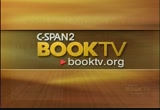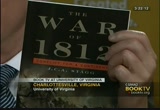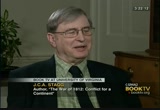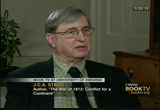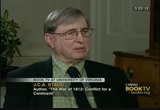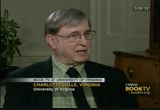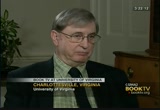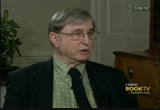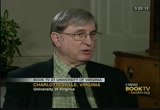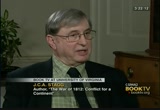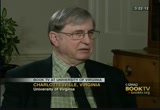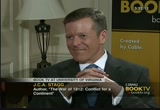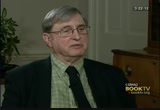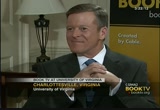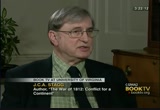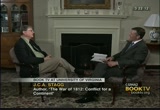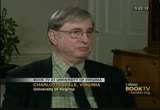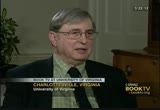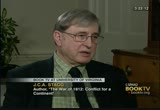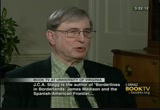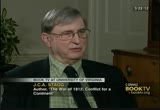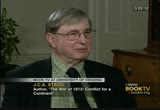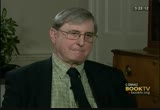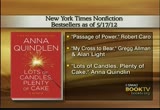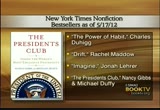tv Book TV CSPAN May 20, 2012 1:00pm-1:25pm EDT
1:00 pm
1:01 pm
necessary sequel the the first war for independence, the american revolution, and they thought that was the case, and the title's more or less, and 20th sempleg rights movement -- 20th century books, and the contemporaries have their own reason of thinking. >> it was called the late war, and it's sort of a biblical parable, a very strange and odd book to read, and so far reproduces the cadences of the
1:02 pm
bible, and thus, james, spake to congress. this is way of thinking about it starts immediately after the war is over in 1915. >> why was the war fought or developed? >> well, it's win of the more tangled problems in his tore i don't -- history war causization. there's a whole range of grievances that the united states had against great britain in the early 19th century. many are associated with maritime disputes between great britain and the united states because this is the middle of that -- napolian wars. they are trying to establish trade, and they are impressing seamen from american vessels because they need to script
1:03 pm
crews to keep the royal navy manned because they were disputing with the british and the indians on the frontier, and british policy affected the prizes very badly, and prizes for american exports slumped during this period causing an agricultural depression making people angry. there's a whole range of those sort of grievances. basically, i think why the war was ultimately fought and why it was fought when it was because many of the disputes have been preceded in 1812 by a number of years without necessarily producing the declaration of war was that by the summer of 1811, the main grievance was something called the council, a british form of executive order, the american equivalent is the executive order issued by the president, and through the executive orders or orders on council, the british proclaimed
1:04 pm
sweeping blockades around europe designed to stop knew rails, -- neutrals, and america is the main neutral lift at this stage in the history of the wars from taking over. they disputed this since 1807, and they hoped the dispute could be solved by diplomacy. the american government realizes diplomacy is not going to solve the problem. the british are not going to remove the orders. until basically they got napolian where they want him which is in a considerably listed dominant position on the european continent meaning as far as the americans are concerned, they will have
1:05 pm
vitality as long as the war lasts. when madison realized that, he calls congress into the early session, this is the famous 12th congress, and says, folks, we need to prepare for war, and it takes off from there. so the war was fought as a tactic to force the british to respect american neutrality, and by 1811 and 1812, diplomacy was exhausted, and madison thinks the only way to do something about this is to go to war to force the british to sign a treaty which will commit them on paper and in an international war to respect american definitions of the neutral rights and interests, and it flows from there onwards. >> u.s. declares war on great britain in this case? >> yes. >> are there british troops in the north american area at the time? >> there were 5,000 troops in
1:06 pm
canada, and troops in their various colonial positions in the west indies, but there were no british troops actually on the territorial limits of the united states in 1811 and 1812. there had been if a number of years after the revolution that's well-known, but after the pace treaty of 1783, the british did not abandon all the american territory that they said they would do. they continued to occupy a chain of forts along the south bank of lawrence and underneath the great lakes extending out to the midwest which was a violation of both the peace treaty and american sovereignty which annoyed americans considerably. they were banned in and so there's no troops on american soil at the time, but that didn't stop them saying british troops in canada are meeting with the indians in the midwest,
1:07 pm
well the, the old west, and that becomes another grievance which becomes part of the whole taping l of problems that the americans want to sort out by going to war. >> host: how popular was the declaration of war in the states at the time? >> guest: well, it's hard to measure in the sense that we take public opinion the way we do now, but it's said to be the most unpopular. and that was said up until the time of the vietnam war, and maybe it was about as unpopular as the vietnam war. the declarations in congress, they were not by wide margins. in the house of representatives or 79, but on 69 against, and in the senate, it was closer. it was 19 to 13 when you put it
1:08 pm
another way, if three votes had change in the senate, the senate would not be able to pass a war bill, and for the senate debated it for nearly two week, and it was touch and go. nobody really knew what the outcome was going to be. that reflected all sorts of misgivings about the war. some of it was sheer doubt about whether it was expent and wise for the united states to go to great britain. after all, they are a heavily armed nation with a large navy, and a fairly sizable army where the united states has neither a sizable army nor a sizable navy. >> host: had a standing army at that point? >> guest: a small army, but on paper was supposed to have 10,000 mens and officers and the ranks, and on the eve of the war, it's a little more than half that, but the other
1:09 pm
political party just to follow-up on the initial question, the federalists, they were bitterly opposed to war. no federalists in congress voted for the war. >> host: who were the federalists of the time? >> guest: well confined to the new england states, but some more prom innocent federalists are james ashton, roofus king, who became the senator from new york. those are the leading federalists. but the federalists had not felt national power since the election of 1800 when they lost to thomas jefferson and the republicans. they've become something of a regional rump based main on on new england, particularly in massachusetts and kentucky. those are the strongholds, and the state governments of those regions and probably the majority of people in the new
1:10 pm
england states, not all of them, but very strongly opposed to the war, the clergy preached against dmon demonstrations, republican congress, assaulted by war and people in the streets when they went back home, the president was hanged in effigy, all of those sorts of things, and partisanship, if the republicans were for a federalist or against it. the federalists thought the war was a major mistake. they tended to be pro-british thought the republicans were pro-french, and this this war served the interest of napolian. the federalists wanted to trade with the british empire and england and wanted to trade generally. republicans tended to try to cut off trade as a way of binging economic pressure to bear on the british. that hurt the interest of federalists, merchants, things
1:11 pm
like boston, and newbury port, and in fairness to them, the war was not in their interests as they understood it and as they experienced it, and they were pretty vocal about it, and eventually, that opposition culminates in the media in the body called the hartford convention, which met in hartford late in 1814. extensively, the purpose of the hartford convention was to try to federal government to provide better defense for new eng land, which they did not they they were doing a good job of by that stage in 1814, and who do something more about getting tax money to the defense of new england, that sort of thing, and so the republicans suspected this was a plot, and what the
1:12 pm
federalists would do would either secede from the union or make an arrangement with the british that would declare new england mutual in the war which they wanted no part. now, none of that came to pass, and even history is not clear what the hartford convention was about. they were careful not to leave a significant paper trail. we have no records of the debates. its actions were more moderate than rhetoric suggested. it was the symptom of in widespread federalist discontent for the war they thought was a misconceived disaster right from the outset. it had no redeeming features at all as far as madison's opponents could see. >> host: professor stagg, how did this war wrap up? >> guest: well, it's often
1:13 pm
said that it's a draw, though, that's not -- i prefer the word "stalemate" to "draw" in the sense that stalemate carries more implications of mutual exhaustion than a simple draw does between two sporting teams which is fairly evenly matched and you just happen not to get a result on that particular occasion. it wrapped up at the end of 1814, and the underlying reason for that was napolian was overthrown in 1814, and the wars in europe were winding down, and in that sense the pretext of the british had been trying to control american trade to europe and things like that were disappearing, and it was becoming more and more questionable whether there was any point on either side, the american or the british side, whether this war should continue
1:14 pm
if peace returned to europe. eventually a peace treatly was negotiated in the city of gent on christmas eve on 1814, and the treaty said absolutely nothing about the issues that had led to war. it's entirely silent on the cause of the war, and that sense, the treaty did not settle the problems the united states wished to solve by going to war. it's largely a document for concern of procedural issues about the peace and the establishment of commissions that deal with unresolved issues in the post war period. the united states chose to interpret that as a significant victory. the canadians have always said it was a great victory because they repelled the american invader, and that's what they celebrated extensively this year
1:15 pm
since we're in the bicentennial year itself now, and many americans don't appear to know this, and the british said they forgot all about the war, and they never even remembered it. that doesn't say much one way or the other, but if you press them hard, they say, well, we certainly don't think the americans won, so there's all jokes that goes round which sources the americans are happy because they think they won the war of 1812. the canadians are even happier because they know they won the war of 1812, and the british are the happiest of all because they forgot the whole thing ever happened. >> host: where did you grow up, professor? >> guest: in new zeal land. >> host: in new zealand? >> guest: yes, in christ church, and americans if they read, they know it as the city that had 10,000 earthquakes over the last year, and that's gained attention in the american media,
1:16 pm
but that's where i grew up and went to undergraduate. >> host: how did you end up at the university of virginia? >> guest: well, they overred me a job. i was back in new zealand at the time teaching american history in the 1980s, and they offered me a job here which included the task of running the papers of james madison which was one of these definitive editions of the papers of the founding fathers. there's a number of them going on. papers of john adams, thomas jefferson, george washington, benjamin franklin. the madison papers are part of that converge. we use that word to describe that. it's comprehensive editions of the papers of the founding fathers, and i've written on madison and the war and they said to me, well, you know, why don't you come and run this project and teach for us in the history department, and you're
1:17 pm
an an throe polingses, and if you're asked to join the tribe, what does the anthropologist do? he accepts the invietnam invita. >> host: when you taught american history in new zealand, what were the important things that you think other people should know about our history? >> guest: you mean foreigners? people overseas? >> host: uh-huh. >> guest: well, i'll give you an example of a misconception when i -- the sort of thing that you have to deal with. american media films, television have an enormous impact on societies like australia and new zeal land because they're the -- the united states is a major producer of those forms of entertainment in popular culture and entertainment and that sort of thing, and english is the
1:18 pm
common lang -- language so in some ways the united states is tremendously influential on culture in those societies, but i'd an start off my classes in new zealand saying how many of you have actually been in the united states? not terribly many had, and those who had, they had been to the west coast. almost nobody had been to the east coast. i remember one student, sort of said to me, she'd been to disney land, and she asked if all america was like disney land, and for a moment you have to pause before you give an answer to that question, but then, of course, you have to say, no. it's enormously large and diverse place with many, many regional differences and the east coast is quite different from the west coast, and i specialized in early american history, and the west coast was not even part of the united
1:19 pm
states so much the subject matter that i taught. really important to convey to them some sense why the united states existed at all, what up dependence was all about -- independence was all about and why the united states wanted to leave the british empire when you teach societies that remained part of the british empire and never broke away from it in the sense that the united states did so you generally your problem is actually to convey some sense of the span of american history, all of if because it was not much taught in the schools. so you have a society which has an enormous number of preconceptions about the united states, which they invite from the american culture, but little of that was grounded in any sort
1:20 pm
of very thorough knowledge of the history of the united states and its development. of course, as the united states is a dominant world power, they are always very conscious of the presence of the united states in all sorts of ways, and they don't know all that much about it, but i don't know how much success people teaching in the universities actually have in altering that much larger picture. you're up against forces beyond the control of the individual professors and in the classroom. >> host: finally, professor stagg, back to the book "war of 1812, conflict for a continent," and at the end of the war, 1815, what was james madison's representation in the u.s.? >> guest: well, it started to improve dramatically from the moment the peace treaty was signed. during the war, it sank low, and everybody thought he made a bad
1:21 pm
job of running the war, and even his own supporters, many of them were somewhat dischanted, and they supported him because they were loyal to him, and they did not like great britain, and they thought the war was just even though the war was not going tesh -- terribly well, and once the war was over, the peace treaty, meant nothing, america suffered no major damages, and they turned survival into victory, and the last years of his presidency were the two mori popular -- two most popular years in his eight year term. it was miserable between 1809 and 1815, but he went out on a great cloud of popularity. >> host: here's the cover of the book, john stagg, professor at university of virginia is the
1:24 pm
>> host: you're watching booktv on c-span2. for the past year or so on booktv, we have. going to universities so that we can meet professors that are are also authors and introduce you to their works as well as some of the other authors that we cover here on booktv. now joining us at the university of virginia in charlottesville is the chair of the
109 Views
IN COLLECTIONS
CSPAN2 Television Archive
Television Archive  Television Archive News Search Service
Television Archive News Search Service 
Uploaded by TV Archive on

 Live Music Archive
Live Music Archive Librivox Free Audio
Librivox Free Audio Metropolitan Museum
Metropolitan Museum Cleveland Museum of Art
Cleveland Museum of Art Internet Arcade
Internet Arcade Console Living Room
Console Living Room Books to Borrow
Books to Borrow Open Library
Open Library TV News
TV News Understanding 9/11
Understanding 9/11